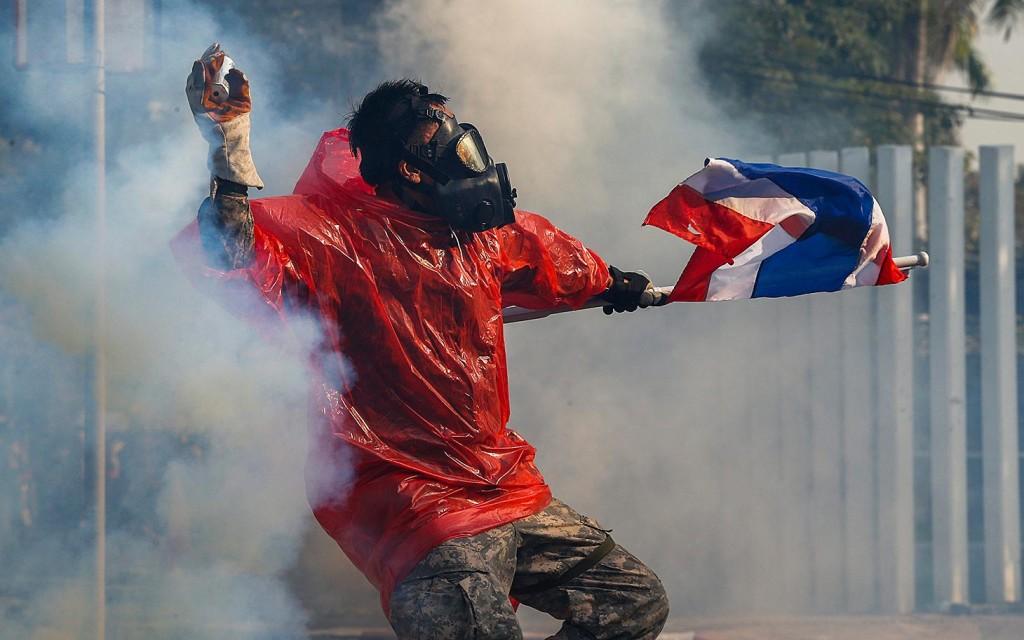Thai Gov. Given New Emergency Authority
March 2014
Some protests in Thailand have turned violent. A man throws a tear gas canister back at the police.
A sixty-day state of emergency decree was given on January 15, 2014 by the Thai government for Bangkok and the surrounding provinces. This decree was given to cope with the unrest induced by large anti-government protests around the capital that aim to force Prime Minister Yingluck Shinawatra to resign. The protesters accuse the government of being run by the former prime minister, Thaksin Shinawatra, brother to the current prime minister.
This state of emergency gives the government wide-ranging authority to deal with the disorder. These new powers include the power to censor the media, ban public gatherings, and detain suspects without charge. It also allows for curfews and for parts of Bangkok to be declared off-limits. “The cabinet decided to invoke the emergency decree to take care of the situation and to enforce the law,” said Deputy Prime Minister Surapong Tovichakchaikul.
The protests have been going on since November due to frustration with the government after a mishandled attempt by Prime Minister Yingluck to pass an amnesty bill that would have opened the door for Thaksin’s return to Thailand. Thaksin was ousted in a military coup in 2006 and remains in self-exile in Dubai to avoid corruption charges that he claims are “politically motivated.” If he were to return, he would risk a two-year prison sentence on a corruption conviction. The protesters claim that Prime Minister Yingluck is a pawn of Thaksin, a man who allegedly built his support on “populist policies that pleased residents of the North and Northeast.” Yingluck has repeatedly denied these assertions.
Prime Minister Yingluck has refused to resign and instead called an election on February 2 in an effort to quell the rising protests and protesters. The state of emergency carried through the date of the general election. Yingluck’s party won easily because of the opposition party’s refusal to participate. Only 45.8 percent of voters participated in this election according to the Election Commission of Thailand, a far lower turnout than the 75 percent in the 2011 election that placed Yingluck in power. Prime Minister Yingluck’s support comes mainly from regions north and east of the capital. These regions are less affluent but have a larger populace. The anti-government movement receives its support from southern Thailand, Bangkok’s middle class, and the established elites.
The protesters were calling for reforms before voting took place, demanding that an unelected caretaker administration, or a “people’s council,” takes control of the country to replace the current government, which they call corrupt, until Thailand’s political system is changed. The government’s decision to continue with the election angered protesters and inflamed tension in Bangkok, where demonstrators were in their third week of an occupation of several main intersections of the city.
Since November 2013, at least ten people have died, and over 600 have been injured due to politically motivated violent protests, according to the Erawan Medical Centre, which monitors Bangkok hospitals. In Lak Si, a district in northern Bangkok of mixed pro and anti-government supporters, gunfire and violence occurred between masked men after government supporters marched on a polling station occupied by anti-government groups. At least eight people were wounded. Both sides fired their weapons, and it is still not clear whether those wounded were the government’s supporters or its opponents.
The leader of the anti-government protests, Suthep Thaugsuban, wants to distance the movement from the rising violence. He believes very strongly in peaceful protests and tells his supporters to not resort to violence. “We need to keep our principles. We fight in peace, with no weapons and violence … We have the right to a peaceful protest,” said Suthep. There were an estimated 2,000 to 3,000 demonstrators on the city streets in late January 2014.
Due to the protests and the state of emergency, the Thai stock market has fallen ten percent since November due to the lack of companies willing to be located in Bangkok, meaning that infrastructure projects will also be delayed. There are also concerns that growing tourism will fall.
Sutthawe Jitjingjai, also known as Par, a Thai university student from Bangkok, spent the 2010-2011 school year as an AFS student at Wilmington Friends School. Her opinions match those of the protesters, but she is not part of the movement. “I personally support the protesters, and I think that the majority of Thai people do. The protesters do not mainly cause the violence, but outsiders instead cause it. For me, the protest has caused bad transportation and has made some universities to close temporarily for safety. I believe that the protest will absolutely settle down when there is a reform for a new government.”
The Thai government has been ordered not to use force against protesters because of clashes between anti-government protesters and riot police that left many dead and many more injured. If both sides are truly willing to use a peaceful approach, then peaceful compromises in Thailand are likely to be expedited.



































